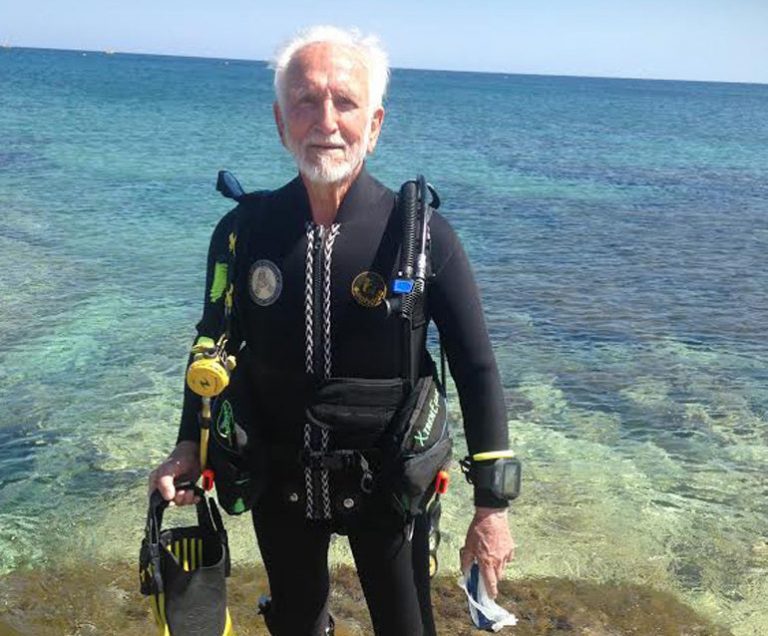DIVING NEWS
Why older divers need to shape up

World’s oldest diver Ray Woolley exercises daily.
“Cardiac issues are now a leading factor in diving fatalities,” said study author and diver Dr Peter Buzzacott, of the University of Western Australia.
“Divers who learned to dive years ago and who are now old and overweight, with high blood pressure and high cholesterol, are at increased risk of dying.”
28 July 2018
Cardiac events now come second only to drowning as a cause of death among divers.
The study acknowledges that leisure-diving fatalities are rare (it cites 181 worldwide in 2015, including 35 in Europe), but says that the numbers involving cardiac issues are climbing.
Between 1989 and 2015, the proportion of diving fatalities involving 50-59 year-olds increased steadily from 15 to 35%, while those among the over-60s soared from 5 to 20%.
Divers have to learn skills and theory and be screened for fitness when they embark on the sport, but the certification they receive lasts for life. “This is where we see an increase in risk,” said Dr Buzzacott. “It’s not commonly new divers who have health problems, because they have been recently screened. It is older divers who have not looked after their health.”
Until now the researchers say there had been no clear picture of how common cardiovascular risk factors were among active divers, because research had been limited to surveys of dive-club members or insured divers.They say the new study, funded by the Divers Alert Network (DAN), is the first to be conducted among divers in the general population.
THE STUDY was based on data from 2011, 2013 and 2015 telephone surveys of US adults conducted by the US Centres for Disease Control & Prevention and including scuba as an activity. The surveys represented nearly 736 million people, 498 million (68%) of whom had been active in the previous month.
Scuba diving was the principal activity of 113,892 people (0.02%), and they were compared with a group of 338,933 active people matched for age, sex, and state of residence whose main activity was not diving. A third of the divers were aged 50 or older. They were often well-educated, more than half earned at least $75,000 a year, and most were married with children.
A significantly greater proportion of divers (54%) had smoked cigarettes at some point compared with non-divers (46%) but more divers had given up smoking (40% versus 26%). Divers were more frequently overweight (48% versus 43%) but had lower mean body mass index overall than the non-divers (26 versus 27 kg/m2).
One-third of divers (33%) had been diagnosed with high blood pressure and 30% had high cholesterol – levels that were not statistically different from the comparison group.
“I gave up smoking because of scuba-diving, and I know this is relatively common from conversations I’ve had on dive-boats with other divers,” said Dr Buzzacott. “My personal advice to all smokers is to give up smoking and take up diving. Not only is it better for you, and more fun, it’s cheaper!”
Dr Buzzacott advised all divers to have routine fitness assessments with their doctor, and tackle risk factors that otherwise could lead to a fatal heart attack while diving.
“Never before in history have so many people been exposing themselves to these extraordinary environmental stresses and, for the first time ever, we now have a large number of people who have spent their entire lives regularly scuba-diving,” he said.
“None of us are as young as we once were and it is important that we stay in shape for diving. The father of scuba, Jacques Cousteau, was diving at 90 and the current world’s oldest diver is 94 [British diver Ray Woolley]. He looks like he’s in great shape and that is the role model for us all if we want to keep diving into our senior years. I certainly do.”
The study is published in the European Journal of Preventive Cardiology.

